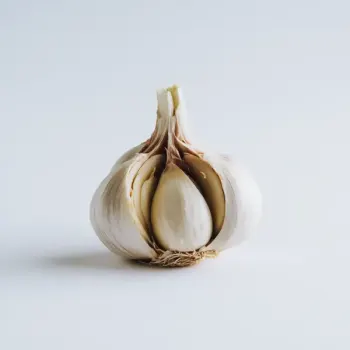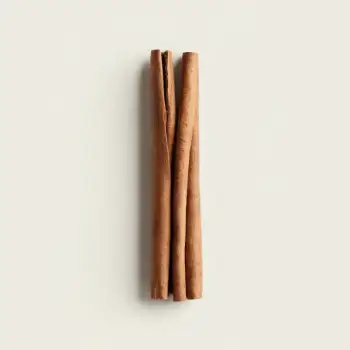Cloves are aromatic flower buds with a sweet, pungent flavor used in cooking for their warmth and complexity. Cinnamon, obtained from the inner bark of Cinnamomum trees, adds a sweet, woody fragrance and a spicy taste to both sweet and savory dishes.

Cloves are the aromatic flower buds of the evergreen clove tree, known for their intense warmth and sweet, pungent flavor. They are commonly used in whole or ground form to impart deep, complex notes to dishes.

Cinnamon is a spice obtained from the inner bark of several tree species from the genus Cinnamomum. It brings a sweet, woody fragrance and a slightly spicy taste that's beloved in both sweet and savory contexts.
Cloves offer a strong, pungent flavor with a numbing sensation on the palate, while cinnamon provides a warm, sweet, and woodsy taste. Cloves are typically used sparingly due to their potency, whereas cinnamon can be used more liberally. The texture of ground cloves is fine and can easily blend into dishes, while cinnamon sticks add a rougher texture and are often removed before serving. Originating from different plants, cloves and cinnamon also have varied health benefits and uses in traditional medicine.

Your ultimate Recipe Box, Meal Planner, and Cooking Class all in one
Ideal for rich, spiced baked goods like gingerbread, pumpkin pie, and spice cakes. Cloves add a depth of flavor and should be used in moderation to avoid overpowering the dish. A go-to for cinnamon rolls, apple pies, and snickerdoodles. Cinnamon's sweet and comforting taste pairs well with fruit-based and chocolate desserts. It is often sprinkled on top for both flavor and presentation.
Best used in spiced teas, mulled wine, and hot toddies. Cloves infuse beverages with a strong spice note that's perfect for cold weather drinks, imparting a warming sensation. A favorite for hot cocoa, spiced cider, and coffee-based drinks. Cinnamon sticks serve as aromatic stirrers, and the ground spice can be used to top off foamy creations, adding a hint of sweetness.
Effective in imparting a strong, aromatic flavor to rich meats like beef or pork. Cloves can be used in slow-cooked dishes, stews, and as part of a spice rub for roasts. Complements lamb and chicken with its subtle sweetness. Cinnamon is often found in Middle Eastern recipes, like Moroccan tagines, and can balance out savory and sweet profiles in meat glazes.
Cloves can be substituted with cinnamon to reduce the intensity of a dish's flavor profile, although the sweet notes of cinnamon may not replicate the boldness of cloves. Conversely, cloves can replace cinnamon to add more punch, but caution is advised as the strong taste can easily dominate other flavors.
Both cloves and cinnamon are known for their antioxidant properties and have been used in traditional medicine for their potential health benefits.
| Nutrient | Cloves ( per Teaspoon ) | Cinnamon ( per Teaspoon ) |
|---|---|---|
| Fat | 0.27g | 0.03g |
| Sodium | 5mg | 0mg |
| Calcium | 30mg | 26mg |
| Protein | 0.13g | 0.10g |
| Calories | 6 | 6 |
| Carbohydrates | 1.38g | 2.1g |
Yes, cloves and cinnamon can be used together to create a complex and layered spice profile, especially in dishes like curries, spiced desserts, and warming beverages.
Both spices offer health benefits and are rich in antioxidants. The choice between them should depend on individual dietary needs and personal taste preferences.
Due to its strong flavor, clove should be used more sparingly than cinnamon. A good rule of thumb is to start with a pinch of cloves and adjust according to taste.
Cinnamon pairs exceptionally well with savory dishes that include fruits or sweeter elements, such as glazed carrots or butternut squash soups, whereas cloves are traditionally used in richer, deeper savory dishes.
Both cloves and cinnamon should be stored in airtight containers, away from heat and light to preserve their flavor and potency for as long as possible.